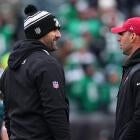
There doesn't appear to be an end in sight for the rift between Aaron Rodgers and the Packers. Rodgers, who is under contract through the 2023 season, wants out of Green Bay while the Packers are adamant he won't be traded. The Packers are trying to salvage their relationship with the reigning NFL MVP. One thing that could reportedly appease Rodgers is Brian Gutekunst's removal as Packers general manager. Gutekunst's job doesn't seem to be in jeopardy. Here are the key upcoming dates regarding the dispute.
May 17
The second phase of NFL voluntary offseason workout programs begins on May 17 and runs through May 21. Teams can have noncontact on-field workouts at a walk-through pace. In the following four weeks, teams are allowed 10 days of organized team practice activity (OTAs). OTAs can be at full speed but also without contact.
Rodgers has a $500,000 workout bonus in his contract in which 85 percent participation in offseason workouts is required to earn the $500,000. Rodgers has had a workout bonus at this amount in every year of his contracts with the Packers since signing his first extension during the middle of the 2008 season. He has collected every one of these bonuses for a total of a $6 million. Skipping all or a significant portion of the second phase and OTAs will prevent Rodgers from meeting the requirements for his 2021 workout bonus.
June 2
Starting on June 2, only the current year's bonus proration counts toward the salary cap when players are released or traded. The proration in future contract years is delayed until the following league year. Should the Packers change their minds about trading Rodgers, he won't be dealt before June 2 because of these salary cap accounting rules.
Rodgers has the NFL's largest 2021 cap number at $37.202 million ($14.352 million of Rodgers' 2021 cap number comes from bonus proration). Another $6.8 million is the roster bonus he earned in March on the third of the league year, making $21.152 million a sunk cost.
A trade prior to June 2 would leave Green Bay with a $38.356 million cap charge relating to Rodgers, which is $1.154 million more than his current 2021 cap number. That figure would shatter the NFL record in dead money, a salary cap charge for a player no longer on a team's roster. The current mark is Carson Wentz's $33,820,611 with the Eagles because of his trade in March to the Colts.
Moving Rodgers after June 1 would create $16.05 million of 2021 cap space for the Packers where there would be $21.152 million of dead money. The Packers would pick up $22.648 million of 2022 cap room by removing Rodgers' $39.852 million 2022 cap number from the equation. Rodgers' 2021 departure would leave $17.204 million of dead money in 2022. Green Bay would also gain $28.352 million of 2023 cap room from having Rodgers come off the books because of a trade.
Rodgers' contract doesn't have a no-trade clause. His preferred destinations if dealt are reportedly the Broncos and Raiders.
June 15-17
The only mandatory event during the offseason is the three-day minicamp teams hold in June. Green Bay's mandatory minicamp is June 15-17. Under the NFL Collective Bargaining Agreement, Rodgers is subject to a fine up to $15,515 for the first missed day, $31,030 for the second missed day and $46,540 for the third missed day. He could be fined up to $93,085 for missing all three days of the minicamp. Fining Rodgers would be at Green Bay's discretion.
Late July (start of training camp)
Rodgers skipping a portion of training camp because of a continued dispute would be costly. Teams are required to fine players like Rodgers, who aren't on rookie contracts, $50,000 per day with training camp absences. Under previous CBAs, the fines could be reduced or waived. Fine forgiveness or reduction is only allowed for players under rookie contracts with the current CBA.
There has been some erroneous reporting about the penalties that would apply to Rodgers for missing training camp. He wouldn't also be fined one week's base salary (1/18th of salary) for each preseason game missed. The CBA clearly states that this particular sanction is reserved for players that signed contracts as unrestricted free agents and first-round picks in the option year. Rodgers has never signed a contract as an unrestricted free agent. He has signed three extensions with the Packers with two years remaining on his existing contract each time.
For CBA fining purposes, training camp runs from the mandatory reporting date through the Sunday before the first regular-season game (Sept. 5). Skipping the entire training camp would cost Rodgers anywhere between $1.75 million and $2 million depending on the actual start date.
Rodgers wouldn't earn an accrued season (a year of service for free agency) if he didn't report to training camp on time. His contract wouldn't toll. Rodgers would get credit for his 2021 contract, so he would have two years left as long as he ended his holdout at some point before the middle of the season as opposed to still having three contract years left regardless of when he reported after missing the mandatory reporting date as has been suggested.
Contract tolling and earning an accrued season are two different things. Once a player has four accrued seasons, additional ones are meaningless. A lengthy regular-season holdout will trigger contract tolling.
The Packers would also have the right to start recovering a portion of the $57.5 million signing bonus Rodgers received in his 2018 extension with a training camp holdout and the $6.8 million roster bonus he earned in March. Recoupment would be at Green Bay's discretion.
The maximum of signing bonus a team can recover in a season is the entire prorated amount for the player in that contract year, which is $11.5 million in Rodgers' case. The Packers only have rights to the roster bonus because he would be breaching his contract in the same year this money is being earned. Because of this, the Packers aren't allowed to recapture any of Rodgers' roster bonuses from 2018, 2019 and 2020. Maximum recoupment amount for 2021 is determined by dividing the $6.8 million into Rodgers' three remaining contract years, which is $2,266,666. Rodgers would have to withhold his services a significant portion of the regular season for these maximum amounts to be reached.
Retirement, which would be a more expensive proposition, is reportedly an option for Rodgers although he has previously stated on several occasions he plans on playing into his 40s. The Packers would be entitled to the remaining $23 million of signing bonus proration in his 2021 and 2022 contract years as well as the $6.8 million roster bonus for a total of $29.8 million if Rodgers never returned to the NFL. Rodgers could afford to pay back the Packers considering he has made $241,927,500 from his NFL player contracts through the 2020 season.
The Packers wouldn't be required to seek repayment. It would be their choice.
![[object Object] Logo](https://sportshub.cbsistatic.com/i/2020/04/22/e9ceb731-8b3f-4c60-98fe-090ab66a2997/screen-shot-2020-04-22-at-11-04-56-am.png)

















